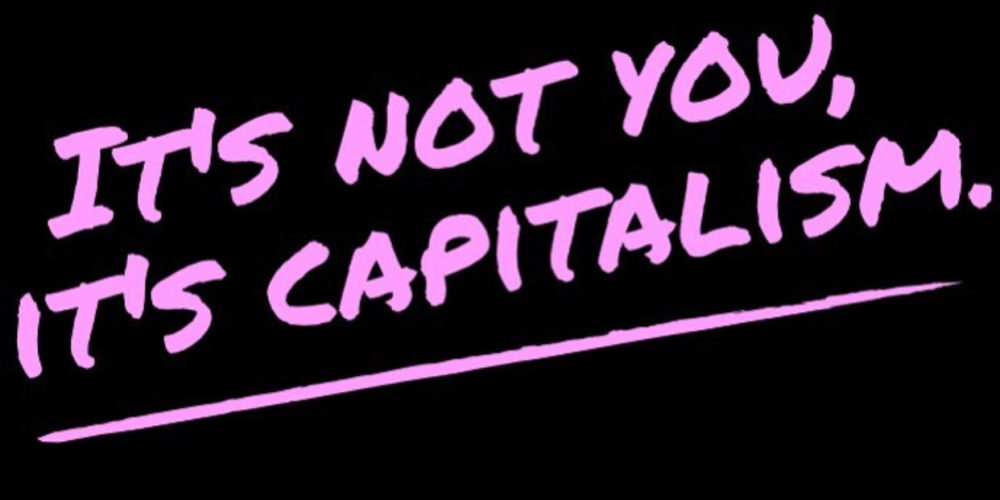It is not in the interests of capitalists to resolve crises: it is in their interests to make money from them. Too often we find that the interests of profit and the interests of the people are irreconcilable. With mental health it is no different.
The capitalist media are happy to allow endless empty talk about mental health crises, precisely because there exists an effective means of commodifying mental illness and turning a profit from it. For example, we are unlikely to encounter front-page headlines calling for action to resolve crises in poverty, illiteracy, racist bigotry, sexual violence, etc.—not because these are not significant problems in our society but because, among other things, there is no easy way for them to be exploited for ready profit.
However, mental health provides, firstly, a fertile ground for the production and sale of a range of related commodities and, secondly, for the commensurate spread of bourgeois ideology, under the guise of depoliticised “self-care” (in other words, “Your mental health is your problem, not ours! Buy some scented candles.”)
Mental health and illness under capitalism
The dominant view of mental health seeks to understand human beings essentially as individuals with more or less defined and consistent personal qualities, each containing a brain that is subject to influence by intrinsic chemical factors, which in turn may cause illness. The social component is almost completely ignored.
It is no accident that this alienated view of humans as selfish and self-contained individuals is precisely the theory of humanity that underpins capitalist ideology.
Under capitalism, someone exhibiting what would be considered a healthy mental state might be able to walk briskly past a dozen homeless people on freezing Dublin streets without sparing a thought, on their way to work repossessing homes for a company that buys up bad debts from the banks, where in turn they will lie, cheat and steal to ensure that they get promoted above their colleagues and treat their “inferiors” with practised disdain.
This sort of manifestly sick behaviour is called having ambition and a healthy work ethic under capitalism. So, what solutions can that same system offer to treating mental illness?
Depression and SSRIs
Take selective serotonin re-uptake inhibitors (SSRIs) as an example. These are the most commonly prescribed pharmacological treatment for depression on the market, with such trade names as Prozac, Zoloft, Celexa, and Lexapro. In Ireland, studies have shown that the prescribing of antidepressants has risen annually since 2009[1], to a point where between 10 and 12 per cent of Irish adults are now being prescribed antidepressants of some kind by their doctors.[2]
However, the efficacy of these drugs has been questioned by scientists for decades, with meta-studies concluding that they are no more effective than placebos in treating depression.[3] These drugs have serious potential side effects, such as nausea, headache, stomach ache, loss of sexual function, suicidal thoughts, etc.
If they are not proved to treat the problem for which they are prescribed, why do we continue to do so? The simple answer is that there is a multi-billion pharmaceutical industry that requires it. The pursuit of profit trumps the welfare of the people every time.
Cognitive behavioural therapy
In terms of psychotherapy, perhaps the most popular form of treatment for depression and anxiety at the moment is cognitive behavioural therapy (CBT). This typically takes place over a short period, say eight sessions over a period of a month or two. In this way it is very cost-effective compared with more long-term therapeutic or counselling methods.
In fact many insurance companies and employers will only pay for CBT if an employee is suffering from depression. The stated goal for them is getting you back to work as quickly as possible.
However, it is not only its relative cheapness that appeals to those with power: CBT also relies on a logic that places the ultimate responsibility for the sufferers’ mental state on the sufferers themselves. This is done by “emotional regulation,” or trying to adapt one’s psychological responses to a distressing situation.[4]
Indeed CBT goes further and asks, “How did you contribute to the suffering you are now experiencing?” It goes without saying that this is an inappropriate way to deal with the suffering of many people, especially those who have experienced trauma. “Therapy didn’t work for you? Well, that’s simply your fault!”
Again, the “one size fits all” approach to treating mental disorders wins out. And why? Because it is more profitable.
The communist response
How then do we respond? As communists, our tasks are as follows:
- to challenge the established paradigm of mental illness and health under capitalism, to promote positive human relations, not exploitative ones;
- to highlight the social and economic factors that contribute to mental disorder as it is now understood, and work towards ending these;
- to fight for a world in which the interests of the people come first and foremost, where their health and dignity are no longer at the mercy of capitalist profiteers.
Notes
1. “HSE prescriptions for antidepressants and anxiety medications up by two thirds since 2009,” The Journal, 1 August 2018 (https://tinyurl.com/vs6yaoa).
2. Martin Wall, “Ten per cent of Irish adults are being prescribed antidepressants,” Irish Times, 5 April 1918 (https://tinyurl.com/rfelrzk).
3. Jacob Stegenga, “Do antidepressants work?” Aeon, 5 March 2019 (https://tinyurl.com/yy6cv4ed).
4. Åsa Jansson, “From self-help to CBT: Regulating emotion in a (neo)liberal world,” History of Emotions Blog, 11 December 2017 (https://tinyurl.com/wx9ubp3).






